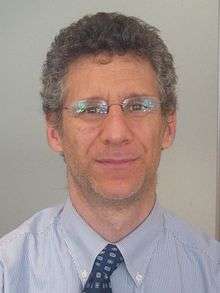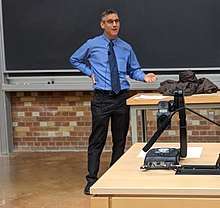Andrew Gelman
Andrew Gelman (born February 11, 1965) is an American statistician, professor of statistics and political science, and director of the Applied Statistics Center at Columbia University. He earned an S.B. in mathematics and in physics from MIT in 1986 and a Ph.D. in statistics from Harvard University in 1990 under the supervision of Donald Rubin.[1][2]
Andrew Gelman | |
|---|---|
 Gelman in 2012 | |
| Born | February 11, 1965 Philadelphia, Pennsylvania |
| Nationality | American |
| Citizenship | American |
| Alma mater | Harvard University Massachusetts Institute of Technology Springbrook High School |
| Home town | Silver Spring, Maryland |
| Children | 3 |
| Scientific career | |
| Fields | Statistics |
| Institutions | Columbia University |
| Doctoral advisor | Donald Rubin |
| Website | www.stat.columbia.edu/~gelman/ |
He has received the Outstanding Statistical Application award from the American Statistical Association three times.[3] He is an elected fellow of the American Statistical Association[4] and the Institute of Mathematical Statistics.[5]
Personal life
Gelman married Caroline Rosenthal in 2002[6] and has three children.[7]
The psychologist Susan Gelman is his older sister.[8] The cartoonist Woody Gelman was his uncle.[9]
Work

Gelman is currently a professor of political science and statistics at Columbia University, where he also directs the Applied Statistics Center.[10] The Applied Statistics Center conducts research with several other departments at Columbia University, as well as containing a number of individual projects.[11] Gelman is a practitioner of Bayesian statistics,[12] and hierarchical models.[13]
He is a major contributor to the statistical programming framework Stan.
Popular press
Gelman is notable for his efforts to make political science and statistics more accessible to journalists and to the public. He is one of the primary authors of The Monkey Cage,[14] a Washington Post blog dedicated to providing informed commentary on politics and making political science more accessible.[15]
Gelman also keeps his own blog which deals with statistical practices in social science.[16] He frequently writes about Bayesian statistics, displaying data, and interesting trends in social science.[17][18][19] According to The New York Times, on the blog "he posts his thoughts on best statistical practices in the sciences, with a frequent emphasis on what he sees as the absurd and unscientific... He is respected enough that his posts are well read; he is cutting enough that many of his critiques are enjoyed with a strong sense of schadenfreude."[20]
Gelman has been prominent as a critic of alleged poor methodological work in the replication crisis.[20] In July 2020, he appeared as a guest on The Filter podcast.[21]
Bibliography
- Andrew Gelman, David Park, Boris Shor, and Jeronimo Cortina. "Red State, Blue State, Rich State, Poor State: Why Americans Vote the Way They Do (2nd edition). Princeton University Press, 2009.
- Andrew Gelman and Jennifer Hill. "Data Analysis Using Regression and Multilevel/Hierarchical Models". Cambridge University Press, 2006. ISBN 978-0-521-68689-1
- Andrew Gelman and Deborah Nolan. "Teaching Statistics: A Bag of Tricks". Oxford University Press, 2002. ISBN 978-0-19-857224-4
- Andrew Gelman, John B. Carlin, Hal S. Stern, David Dunson, Aki Vehtari, and Donald B. Rubin. "Bayesian Data Analysis" (3rd edition). Chapman & Hall/CRC, 2013.
References
- Andrew Gelman at the Mathematics Genealogy Project
- Kesselman, Ellie (10 September 2014). "Statistics comes to Swarthmore College". Retrieved 19 November 2016.
...familiar name on that very short list of all Harvard Statistics PhD alumni: Columbia University political science and statistics professor Andrew Gelman in 1990
- "Outstanding Statistical Application Award". American Statistical Association. Archived from the original on 8 April 2016.
- ASA Fellows: http://www.amstat.org/careers/fellowslist.cfm
- IMS Fellows: http://www.imstat.org/awards/honored_fellows.htm Archived 2014-03-02 at the Wayback Machine
- "WEDDINGS; Caroline Rosenthal, Andrew Gelman". The New York Times. 2002-05-12. ISSN 0362-4331. Archived from the original on 2017-12-13. Retrieved 2016-11-03.
- "The way science works…or doesn't". Life After Baby. Archived from the original on 2017-12-14. Retrieved 2016-11-03.
- Galef, Julia; Gelman, Susan (December 13, 2015). "Susan Gelman on 'How essentialism shapes our thinking'". Rationally Speaking: Official Podcast of New York City Skeptics. Episode RS 149. Archived from the original on June 25, 2018. Full transcript (PDF). Retrieved May 12, 2018.
- Gelman, Andrew (14 July 2006). "Uncle Woody". Statistical Modeling, Causal Inference, and Social Science. Archived from the original on 25 December 2018. Retrieved 5 July 2018.
- Andrew Gelman, Department of Statistics and Department of Political Science, Columbia University: http://www.stat.columbia.edu/~gelman/
- Applied Statistics Center: http://applied.stat.columbia.edu/
- Andrew Gelman, John B. Carlin, Hal S. Stern and Donald B. Rubin. "Bayesian Data Analysis" (2nd edition). Chapman & Hall/CRC, 2003. ISBN 978-1-58488-388-3
- Gelman, Andrew (2006). "Multilevel (hierarchical) modeling: what it can and cannot do" (PDF). Technometrics. 48 (3): 432–435. doi:10.1198/004017005000000661. Archived (PDF) from the original on 6 May 2006.
- "Monkey Cage". The Washington Post. Retrieved 19 November 2016.
- The Monkey Cage: http://themonkeycage.org/2007/11/20/why_this_blog/
- Statistical Modeling, Causal Inference, and Social Science: http://andrewgelman.com/
- How Do I Make My Graphs?: http://andrewgelman.com/2013/03/15/how-do-i-make-my-graphs/
- Exponential Increase In The Number of Stat Majors: http://andrewgelman.com/2013/04/21/exponential-increase-in-the-number-of-stat-majors/
- Everyone’s trading bias for variance at some point, it’s just done at different places in the analyses: http://andrewgelman.com/2013/03/14/everyones-trading-bias-for-variance-at-some-point-its-just-done-at-different-places-in-the-analyses/
- Dominus, Susan (2017-10-18). "When the Revolution Came for Amy Cuddy". The New York Times. ISSN 0362-4331. Retrieved 2017-10-19.
- Ep 12: Andrew Gelman on Data, Modeling, and Uncertainty Amidst the Forking Paths: https://mattasher.com/2020/07/25/episode-12-andrew-gelman-on-data-modeling-and-uncertainty-amidst-the-forking-paths/
External links
| Wikimedia Commons has media related to Andrew Gelman. |
| Wikiquote has quotations related to: Andrew Gelman |
- Home page
- Statistical Modeling, Causal Inference, and Social Science. Andrew Gelman's research blog.